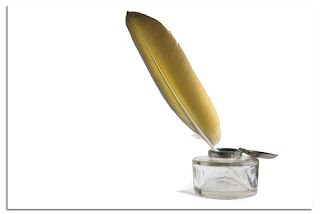
Thomas Kyd was a contemporary of Shakespeare or more specifically a playwright who preceded the Bard both chronologically and artistically. Kyd's most famous work was "The Spanish Tragedy," a revenge tragedy which was apparently very successful on the Elizabeth stage. The work has multiple revenge themes including a character named simply revenge, who provides a chorus like function commenting on the action of each act.
The tragic hero the play is Hieronimo who serves at the court of the King of Spain without being of noble blood himself. Hieronimo's son, Horatio is murdered by two of the characters among other things to end his romance with Bel-Imperia, the female lead. Understandably upon discovering the murder and the murderer, Hieronimo vows revenge which he first seeks unsuccessfully through the "system." Undeterred by this obstacle, he proceeds to achieve his goal through the use of a play within in a play.
If the latter sounds familiar, it is, of course, a mechanism that Shakespeare will use in "Hamlet," another, more fully developed revenge tragedy. In fact, a great deal of Kyd's significance in the history of drama is how much of what happens "Hamlet" - the use of ghosts, the play within a play is seen in this earlier play. There has also been speculation, although without any documented evidence, that Kyd was the author of the Ur Hamlet, an earlier version of the play now lost.
Last weekend I listened to a BBC archived broadcast of an interview with noted Shakespearean scholar Jonathan Bate and two other scholars about revenge tragedies from Kyd through Shakespeare. Bate made the point that in the case of "Hamlet," as in much of Shakespeare, the original source material has been given a much more in depth treatment. According to Bate, much of what is considered to be Hamlet's vacillation about revenging the death of his father is his inner debate about the right and wrong of revenge. That's an issue that is of some interest - much of the intellectual/moral world where I have spent a lot of time suggests that revenge is an empty human motivation that doesn't produce the benefits one expects. Reading "The Spanish Tragedy" showed me how revenge can escalate far beyond the original issue, perhaps making its value somewhat questionable. It will now give me an additional perspective on "Hamlet" which I expect to see at least once this fall.


























